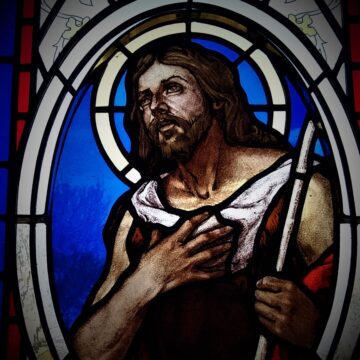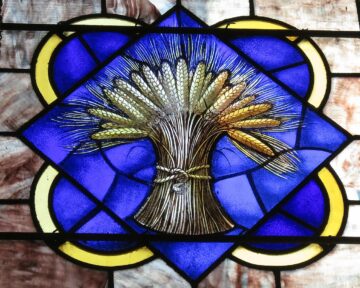Franciscan Friar Fr. Paul Gallagher reflects on the Gospel for the Second Sunday of Advent, December 4, 2022. The content is edited by Franciscan Sister of Christian Charity Sister Anne Marie Lom and Joe Thiel. The excerpts from the Sunday readings are prepared by Joe Thiel. To read or download the complete pdf with excerpts for your prayer, please click here: Franciscan Gospel Reflection December 4 2022. Excerpts are from the Lectionary for Mass for Use in the Dioceses of the United States of America, second typical edition © 2001, 1998, 1997, 1986, 1970 Confraternity of Christian Doctrine, Inc., Washington, DC. Used with permission. All rights reserved. No portion of this text may be reproduced by any means without permission in writing from the copyright owner. (Photo: St. Teresa of Calcutta Parish, North Lake, Wisconsin, shares this stained glass window of St. John the Baptist which can be found in their gathering space. Deacon Allen Olson is the current parish administrator. Fr. Clyde Rausch, OMI, wrote the icon. Find out more about Fr. Clyde and this beautiful church here.)
Matthew 3:1-12
 In those days John the Baptist appeared, preaching in the desert of Judea and saying, “Repent, for the kingdom of heaven is at hand!” It was of him that the prophet Isaiah had spoken when he said: “A voice of one crying out in the desert, ‘Prepare the way of the Lord, make straight his paths.'” John wore clothing made of camel’s hair and had a leather belt around his waist. His food was locusts and wild honey. At that time Jerusalem, all Judea, and the whole region around the Jordan were going out to him and were being baptized by him in the Jordan River as they acknowledged their sins.
In those days John the Baptist appeared, preaching in the desert of Judea and saying, “Repent, for the kingdom of heaven is at hand!” It was of him that the prophet Isaiah had spoken when he said: “A voice of one crying out in the desert, ‘Prepare the way of the Lord, make straight his paths.'” John wore clothing made of camel’s hair and had a leather belt around his waist. His food was locusts and wild honey. At that time Jerusalem, all Judea, and the whole region around the Jordan were going out to him and were being baptized by him in the Jordan River as they acknowledged their sins.
When he saw many of the Pharisees and Sadducees coming to his baptism, he said to them, “You brood of vipers! Who warned you to flee from the coming wrath? Produce good fruit as evidence of your repentance. And do not presume to say to yourselves, ‘We have Abraham as our father.’ For I tell you, God can raise up children to Abraham from these stones. Even now the ax lies at the root of the trees. Therefore every tree that does not bear good fruit will be cut down and thrown into the fire.
I am baptizing you with water, for repentance, but the one who is coming after me is mightier than I. I am not worthy to carry his sandals. He will baptize you with the Holy Spirit and fire. His winnowing fan is in his hand. He will clear his threshing floor and gather his wheat into his barn, but the chaff he will burn with unquenchable fire.”
Background:
This is the second week of the new church year and the second Sunday of Advent. Advent is preparation for the arrival of an important person. You may think of your school being prepared for a visit from the central office, or from a religious superior of the sponsoring religious community. Perhaps more current would be a representative from a grant foundation to which you have applied for assistance. You can make your own comparisons, but what is being heralded is the coming of someone of importance, and it merits everyone’s awareness and preparation.
 In today’s gospel it is John the Baptist who calls us to prepare for the arrival of the one whom John is not worthy to even carry his sandals. Matthew’s description of John is much different than what is found in Luke’s gospel. Luke choses to focus on the common family (that Jesus and John are related cousins), while still making sure his audience recognizes that Jesus is the more significant of the two. Matthew focuses more on John as a prophet, a person in the line of prophets of the Hebrew people who tried to help the people to see God working in their midst. Thus, John is described as dressing in camel hair with a leather belt and eating locusts and wild honey, things that link him to prophets of old like Samson, Samuel, or Elijah, who also spoke of resistance to injustice and looked for social reform.
In today’s gospel it is John the Baptist who calls us to prepare for the arrival of the one whom John is not worthy to even carry his sandals. Matthew’s description of John is much different than what is found in Luke’s gospel. Luke choses to focus on the common family (that Jesus and John are related cousins), while still making sure his audience recognizes that Jesus is the more significant of the two. Matthew focuses more on John as a prophet, a person in the line of prophets of the Hebrew people who tried to help the people to see God working in their midst. Thus, John is described as dressing in camel hair with a leather belt and eating locusts and wild honey, things that link him to prophets of old like Samson, Samuel, or Elijah, who also spoke of resistance to injustice and looked for social reform.
John is reminding the people to prepare for the coming of Jesus with his particular expectation. Jesus is one whom John is not worthy to even carry his sandals, and he is one who clears the threshing floor and gathers the wheat into his barn. John is asking for the people to prepare themselves for his arrival, but also to be instruments of preparation. The repentance he seeks is more than personal, but social transformation that leads to just relationships being lived throughout the society. In order to emphasize the connection between repentance and changing one’s life, John calls the Pharisees and Sadducees a “brood of vipers,” understood as offspring of snakes. The Pharisees drew importance on maintaining their ancestral heritage by faithfully keeping religious traditions. To call them offspring of snakes would admonish their “show” of repentance without the “good fruit as evidence of your repentance.”
At that time there was great unrest with authority, both civil and religious. Rome and the priestly aristocracy of Jerusalem exploited the common person by not confronting the systems that kept most people in need of even the basic necessities for life. Ancestral property was confiscated, and taxes were unaffordably high. The social climate was one of unrest and desire for change. Many gave in to grumbling and complaining. Others looked for the Messiah, someone from the outside, to bring about the changes for which they longed. Instead of giving in to grumbling and complaining, John preached repentance in order to prepare for the coming of the Messiah. But John looked for a Messiah who would come with power to change the world order of the day. “I am baptizing you with water, for repentance, but the one who is coming after me is mightier than I.” (Matthew 3:11)
The gospel text that the Church has chosen for this second Sunday of Advent presents a challenge to use this time of Advent not just to prepare for the celebration of the birth of Jesus, but also the total life, mission, and lived reality of the Kingdom of God that Jesus’ birth inaugurated. It calls the church to look beyond individual transformation to changes in society and our institutions that are needed, and to ask what part we might be asked to play in what is needed in our culture and society. Or perhaps, how are we resistant to the kind of changes that need to take place for others to live with the dignity that is theirs as God’s daughters and sons? Photo: Photo: Nheyob, CC BY-SA 4.0 <https://creativecommons.org/licenses/by-sa/4.0>, via Wikimedia Commons
Reflection Questions:
- When you think about Advent being a time of preparation for an arrival, is there a memory you have of preparing for the arrival of a person, a relative, an exchange student, or a supervisor that comes to mind?
- What were some of the feelings that arose within you during that period? What are some of the ways those feelings got expressed?
- How does today’s gospel fit with the way you have been thinking about the coming of Christmas?
- What comes to mind as you hear Matthew describing John as being in the desert, eating locusts and wild honey, and preaching repentance?
- What are some of the things that arise in you as you hear John’s message in today’s gospel?
- By coming out to be baptized, people were publicly admitting their faults. Has there ever been a time when you were willing to admit your failure, or maybe even needed to admit those failures?
- What impact does that willingness have on your life and the lives of others?
- Can you take some time to talk with God about your desire to use this time before Christmas as a time for preparation for the arrival of God and God’s reign, or some other hope for God’s lived presence in your life or society?
Interested in an Advent Calendar of Light? Joe Thiel designed one for you. Click here: 2022 Advent Calendar of Light – Year A


